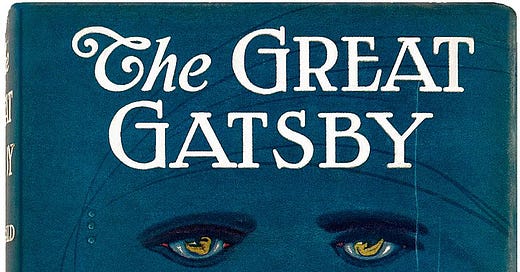The Great American
100 years of Gatsby, and a gratuitous photo from my gilded wedding because I'm a jazz baby at heart and nobody can stop me
The Great American Novel is one hundred years old today. I’m talking about The Great Gatsby. I’m just going to assert that it is the Great American Novel: full stop and no argument. It’s not actually the greatest; we can talk about many other books as the greatest, which should lead us into the questions of what greatness is, and what’s so particularly American about it, and why this idea is so heart wrenching. It is absolutely heart wrenching: it’s saccharine and overplayed, but I want to believe and know it as true; I want to read that book and live in a world where books are known with that kinda reverence; in fact I want to write it myself, as any writer, all writers, must. Must. That’s what the Great American Novel actually means.
No one but America has this concept, this collective secret driving wish, meaning the dream itself is essentially American. Today, a Great American Anything feels rotten. This causes a kind of outraged sadness so big only art can touch it. Art like Gatsby. This feels personal. I cried about it a little bit this morning.
I first read Gatsby, as most American kids do, in school. I loved it desperately, which is the only way a teenager knows how to love. The sentences were just so glittery. Daisy’s voice was, actually, “pure money”. New York was “always the city seen for the first time, in its first wild promise of all the mystery and the beauty in the world,” which made me sure I was going to live there. “All the mystery and beauty in the world” probably started my alcoholic joyriding. But it wasn’t just the sentences, that cocaine like rush of decadence: I had an amazing English teacher. This teacher saved my life in a couple of different ways. One of them was a way of reading.
“But what does that green light stand for!?” he’d say, over and over again, making the magic of symbolism explicit to me for the first time in my life while the pimpled boy in front of me couldn’t care less and carved his name into the desk with a bic. The magic of art is taking it personally. In Great Art, it’s being taken personally, in a kind of correspondence that shifts agency and leaves you breathless. The beckoning light is a mystery to readers: it means something to Gatsby. It haunts and it drives him. My teacher helped me reckon with the idea of dreams, compulsion, and aspiration; Gatsby had his, but what was mine? (But what does it really mean?!”) Eventually the plot unspools and we come to know what the light means - the mystery dissolves and the reality is horrifying. The dream crashes. It’s a car wreck. Jay Gatsby is a beautiful monster.
F. Scott Fitzgerald was a monster who wanted to be beautiful. He gets “The Great American Novel” simply because nobody ever wanted it so badly. I’m giving it to him like a consolation prize. Others have wanted it as much as he did; but nobody ever wanted it so bad. He wanted to leave the midwest. He wanted rub elbows with the New York and Long Island elite, he wanted to out laurel his Ivy League peers, ravish the Southern belles and their money, fight and win glory with the soldiers of the Great War, drink with great writers, best the paragons of European literature, and out class the Old World entirely. Carousing in his Renault. Jazz and dollars flying out the windows. But he failed.1 He failed at everything. He was an alcoholic tragedy who irritated everything and everybody he got close to. Like a teenager, he could only understand love and literature desperately.
Keep reading with a 7-day free trial
Subscribe to Gristle and Bone to keep reading this post and get 7 days of free access to the full post archives.




